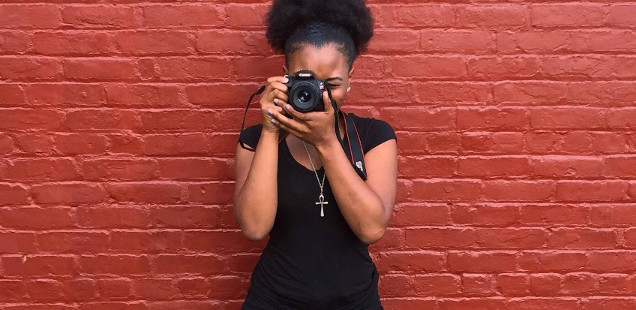
Activist Spotlight: Briana Browne ’17
After hearing men say they would “never date a black girl,” Pace senior Briana Browne felt moved to create a video giving voice to the opinions of black women on this statement and providing an opportunity for their reactions to encourage and inspire other women. Her film, “I Would Never Date a Black Girl,” now has nearly 25,000 views and more than 700 comments on YouTube, and has inspired debate, discussion, and engaged conversation around black feminism, internalized racism, and the power of art to create social change. Read on to learn more about Briana and her work as an artivist!
Year of Graduation: 2017
Major: Communications
Minor: Arts & Entertainment Management
Career Aspirations: To have my own television network that shows more positive images of the Black community and continue to build my brand. I also hope to have at least 2 movies on the big screen that can change the lives of many.
The term feminism itself highlighted the White woman experience, as opposed to the experience of a Black female in a white man’s world. Although both reveal the hardships of womanhood from suffrage rights to income inequalities, I feel as though my art reveals how black women are seen in today’s society.
What are some reactions you received after creating “I Would Never Date a Black Girl”? Can you share the inspiration behind the video?
“I Would Never Date a Black Girl” was my first controversial video I’ve ever done; it was something different for me. I usually do documentaries, interviews, and I’m slowly moving toward short films. I heard that statement numerous times and I wanted to give Black females an opportunity to voice their opinion on it; I wanted to get their perspective. In addition, I wanted Black females to see this video and not feel discouraged when they heard that statement. I was also curious to see what people’s reactions would be when they saw this video. I’ve gotten a mix of positive and negative reactions. Some people agree on the message the video presents, while others don’t – but everyone is entitled to their own opinions. At the end of the day, my goal was to get people talking and I’m happy that it did.
We love the affirming statements made by female participants in the video, such as “I’m a Black woman, so obviously I’m going to love myself. So why wouldn’t someone else love me, for me?” How do you see your video fitting into the larger framework of gender equality?
I think my video can relate to all women – not just women of color but any race – nationally or internationally. Women all over face equality issues and my video just touches on the internal inequality within the black community.
I honestly believe our generation has the ability to make a difference. There’s so much creativity and potential in all of us and we use our talents to influence others in the world.
Do you consider your video a “feminist video”? If yes, how do your personal feminist beliefs influence your creative process?
I feel like my art is more so relevant towards Black feminism, in the sense where arguments of sexism, class oppression, and racism are bound together. The term feminism itself highlighted the White woman experience, as opposed to the experience of a Black female in a white man’s world. Although both reveal the hardships of womanhood from suffrage rights to income inequalities, I feel as though my art reveals how black women are seen in today’s society.
You were one of the featured artists in #PaceUEndRape’s Feminist ARTivism Gallery last semester. What does “artivism” mean to you? How do you balance being an artist with being an activist?
That’s a good question. ARTivism to me is using your talent or skills to bring awareness to anything you feel strongly about. It can be a painting, poem, video, photography etc. For me personally, I like to create art that can serve a purpose, whether it’s empowering people or bringing awareness to a situation.
Art should be used to not only express yourself, but to also influence others in a positive way so that it’s an ongoing cycle.
When did you know that you wanted to be a videographer?
I knew that I wanted to be a videographer when I came across this female director named Vashtie. I always loved her work. I also realized there aren’t many female videographers in the industry and I wanted to be one of the few that went in the film/video industry. I honestly think there’s nothing like watching a good visual that can bring emotions out of you. There is something about moving pictures that excites me.
How do you see our generation impacting the world right now?
I think our generation is full of so much ambition and fire. I honestly believe our generation has the ability to make a difference. There’s so much creativity and potential in all of us and we use our talents to influence others in the world.
Your video addresses internalized racism in the Black community. How do you suggest that we empower individuals in marginalized communities without further oppressing them?
Well for me, I’m using my art to do just that. My goal is create visuals that can influence and empower the Black community and motivate someone to use their talent/skills to do the same. Art should be used to not only express yourself, but to also influence others in a positive way so that it’s an ongoing cycle.
Do you know a Pace student doing amazing work who should be featured as a volunteer or activist spotlight? Get in touch with us at ccarny@pace.edu!





